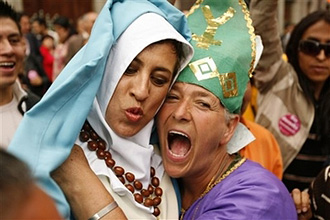 |
 |
 |
 Editorials | July 2007 Editorials | July 2007  
Mexico’s Debate Over Values
 Allan Wall - PVNN Allan Wall - PVNN


| | Pro-choice activists dressed as Roman Catholic clergy celebrate outside of the City Legislature in Mexico City, following lawmakers vote to legalize abortion in late April, 2007. (AP) |
Disagreement over gay marriage? Arguing over sex education? Fighting over abortion in the court and Congress? Are we talking about the United States? We could be, but nowadays we could also be talking about Mexico. The past year has seen debates over moral values, over issues which formerly were not political issues.

The Mexican values debates has attracted the attention of journalists in the U.S. who seem amazed at it. They often preface their articles by saying something like “Conservative Mexico” or “Catholic Mexico.”

Actually, these changes have been underfoot for quite some time, it’s just that many people’s ideas about Mexico are 50 years out of date.

It surprises people to know that Mexico, like other Western countries, has been undergoing vast social changes and modifications of social attitudes. The percentage of single-parent families are growing, premarital sex is more accepted, homosexuality is out in the open, and abortion is more common than ever.

Not that everybody is in agreement on these issues, by no means whatsoever. But the old social compact has been broken. In the old days, these things existed but they weren’t out in the open. Now they are.

At the same time, the once universal influence of the Catholic Church has rapidly declined. Although the Catholic percentage of the population is pegged at somewhere between 80-90%, estimates indicate that only about 25% of Mexicans are serious Catholics. Many Mexicans don’t really have a personal religious faith, and though christened as infants and married in the church, will seldom darken the church door. The Mexican Catholic church also faces a severe priest shortage, and has to import priests.

Nevertheless, there is a still a hard-core Catholic contingent, and the hierarchy of the Catholic church is determined to continue engaging the society, to speak up for the Catholic view of things. Mexico ’s Archbishop has spoken out repeatedly against abortion and same sex marriage.

The Catholic Church and the Mexican government have clashed many times in Mexican history before. During the 1800s there were conflicts. In politics, the “Conservative” faction was pro-clerical and the “Liberal” faction anti-clerical, and in the 1920s there was the violent conflict known as the “Cristeros” rebellion.

Those clashes were fundamentally different than today’s however. Previous conflicts were fought over power, the role of Catholicism in society and property (the Catholic Church once owned about 50% of the country’s property). Today’s conflicts are over moral values, and that’s another thing entirely.

For most of the 20th century, there was an unspoken social compact in Mexican society. The church was excluded from political power, and the political world was almost completely secular. Bu the church was free to maintain its internal affairs. Meanwhile Mexican moral and legal values were firmly based upon traditional Western Christian principles. (Not that everybody followed those principles, but most everybody acknowledged them.)

Those days have come to an end. Now there are open disputes over the moral and legal values that will govern society.

There are, of course, unavoidable political ramifications. The PAN (National Action Party) is traditionally more aligned with the Catholic Church, which the PRI (Institutional Revolutionary Party) and the PRD (Revolutionary Democratic Party) are more secular.

The Mexican constitution is very secular, and Mexican law forbids churches getting involved in politics. That means the archbishop is running a fine line when he speaks out on moral issues with political implications. The PRD-run Mexico City government sends agents to attend each mass in Mexico City’s metropolitan cathedral, in order to monitor what the archbishop says in his sermon, in case it’s political! (And how can the archbishop forbid anyone from attending mass!)

And since the Roman Catholic Pope is technically the head of state of the Vatican, when he makes comments related to these issues, that’s resented as meddling by those who aren’t in agreement.

And what about the Protestants? Protestantism is growing in Mexico, with 7% of the Mexican population now Protestant. In the United States, evangelical Protestants have joined forces with conservative Catholics to fight abortion and deal with other social issues. Will that happen in Mexico? It doesn’t seem to be yet. Religiously, there is a bigger gap between Mexican Catholics and Protestants, and U.S. Catholics and Protestants.

It’s not impossible that the gap could narrow though, as there’s nothing like a common cause to bring people together, even those who disagree in other areas.
 Allan Wall is an American citizen who has been teaching English in Mexico since 1991, and writing articles about various aspects of Mexico and Mexican society for the past decade. Some of these articles are about Mexico's political scene, history and culture, tourism, and Mexican emigration as viewed from south of the border, which you can read on his website at AllanWall.net. Allan Wall is an American citizen who has been teaching English in Mexico since 1991, and writing articles about various aspects of Mexico and Mexican society for the past decade. Some of these articles are about Mexico's political scene, history and culture, tourism, and Mexican emigration as viewed from south of the border, which you can read on his website at AllanWall.net.

Click HERE for more articles by Allan Wall. | 
 | |
 |



